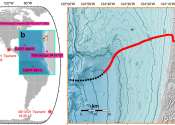Fiber optic cables are an effective way to detect tsunamis, researchers show
Fiber optic cables that line ocean floors could provide a less expensive, more comprehensive alternative to the current buoys that act as early warning systems for tsunamis, says a University of Michigan researcher.
Feb 13, 2024
0
68









